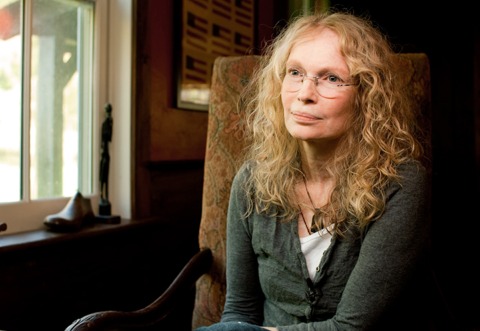Moses Farrow’s posting this afternoon is so extraordinary, I wanted to write a second piece about it.
For 25 years, Mia Farrow has carried out a vendetta against Woody Allen that had no fact behind it. But she was clever. She cast Woody as a child molester, and brainwashed her children into believing it.
But Moses Farrow, several years older than Ronan or Dylan, was a witness. He writes in his piece: I was there – in the house, in the room.”
Moses knows Woody did nothing wrong.
But Mia Farrow, he says, was abusive:
When I didn’t give the answer she wanted, she slapped my face, knocking off my glasses. She told me I was lying and directed me to tell my brothers and sisters that I had taken the tape measure. Through my tears I listened to her as she explained that we would rehearse what should have happened. She would walk into the room and I would tell her I was sorry for taking the tape measure, that I had taken it to play with and that I would never do it again. She made me rehearse it at least a half-dozen times.
Moses writes about his mother’s family:
But the fatal dysfunction within my childhood home had nothing to do with Woody. It began long before he entered the picture and came straight from a deep and persistent darkness within the Farrow family.
It was common knowledge in Hollywood that my grandfather, the director John Farrow, was a notorious drinker and serial philanderer. There were numerous alcohol-fueled arguments between her parents, and Mia told me that she was the victim of attempted molestation within her own family. Her brother, my uncle John, who visited us many times when we were young, is currently in prison on a conviction of multiple child molestation charges. (My mother has never publicly commented on this or expressed concern about his victims.) My uncle Patrick and his family would often come by, but those visits could end abruptly as Mia and Patrick would often wind up arguing. Patrick would commit suicide in 2009.
He also writes about the children whom Mia adopted: For all of us, life under my mother’s roof was impossible if you didn’t do exactly what you were told, no matter how questionable the demand…
Most media sources claim my sister Tam died of “heart failure” at the age of 21. In fact, Tam struggled with depression for much of her life, a situation exacerbated by my mother refusing to get her help, insisting that Tam was just “moody.” One afternoon in 2000, after one final fight with Mia, which ended with my mother leaving the house, Tam committed suicide by overdosing on pills. My mother would tell others that the drug overdose was accidental, saying that Tam, who was blind, didn’t know which pills she was taking. But Tam had both an ironclad memory and sense of spatial recognition. And, of course, blindness didn’t impair her ability to count.
The details of Tam’s overdose and the fight with Mia that precipitated it were relayed directly to me by my brother Thaddeus, a first-hand witness. Tragically, he is no longer able to confirm this account. Just two years ago, Thaddeus also committed suicide by shooting himself in his car, less than 10 minutes from my mother’s house.
My sister Lark was another fatality. She wound up on a path of self-destruction, struggled with addiction, and eventually died in poverty from AIDS-related causes in 2008 at age 35.

